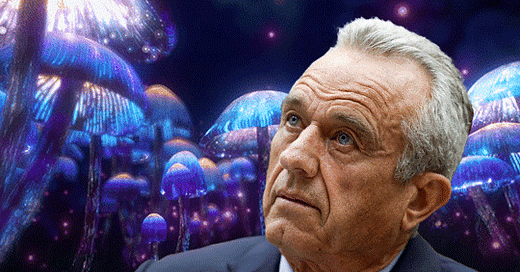RFK Wants Psychedelics—Free From ‘Corporate Control’
Plus: Trump shocks and awes Republican lawmakers with Xi invite.
For decades, the federal government’s stance on psychedelic drugs has been that they are a threat to public health and safety, on par with that of hardcore substances. Despite showing no addictive properties, LSD and psilocybin (mushrooms) are classified as schedule I drugs, which places them on a level with meth and heroin and above drugs like cocaine and fentanyl.
But since last December, when President Joe Biden signed into law a bill that authorizes researchers to study psychedelics in treating PTSD and other brain disorders for active-duty servicemembers, the government’s stance has started to change. Rep. Dan Crenshaw (R-Tex.), who authored the bill, told me he’s awaiting new guidance from the Department of Defense. “That’s gonna take time,” he added.
There have also been broader attempts to decriminalize psychedelic drugs for recreational use at different levels of government. The results of these changes have been panned by law enforcement, and in some cases, state laws decriminalizing drugs have been overturned. Still, advocates of decriminalization have a potentially valuable ally in health and human services secretary nominee Robert F. Kennedy Jr.
In a 2022 interview, Kennedy acknowledged using the drugs in question. “I used psychedelics when I was a kid, but I didn’t use them therapeutically,” he said.
In another interview, which Kennedy posted to his official YouTube channel early in the spring, the soon-to-be top health care official in the United States said, “My mind is open to the idea that, you know, there may be things that I don’t know about and that people ought to have the freedom and the liberty to experiment with these things.” Over the tender strains of a didgeridoo and a succession of shifting mandalas and cosmic animations, he described sending his son to Patagonia for an Ayahuasca trip, an episode that altered his view of psychedelic drugs. But while Kennedy now thinks more people should be able to have experiences like his son’s, he is quick to clarify that the public’s access should not be controlled by drug companies:
I like what you said at the outset, which is we know the capacity of the pharmaceutical industry to come and capture this if they see that there’s money in it and then to turn it into something very, very bad and to promote it in ways that it shouldn’t be promoted. My inclination would be to make this available at least in therapeutic settings, and maybe more generally, but in ways that would discourage the corporate control and exploitation of it.
Curious about other Republicans’ stances on the issue, I asked secretary of defense nominee Pete Hegseth whether he supports psychedelic therapy for veterans. He gave me a look of shock at being asked about something other than the various personal issues imperiling his nomination. “Lots of time for those conversations,” he replied. The same thing happened when I asked former Rep. Doug Collins (R-Ga.), whom Trump picked to lead the Department of Veterans Affairs. Drug policy may not have been included on their printed itineraries for their meetings with senators this week, but the topic is certainly top of mind for many lawmakers as the Trump administration takes shape.





